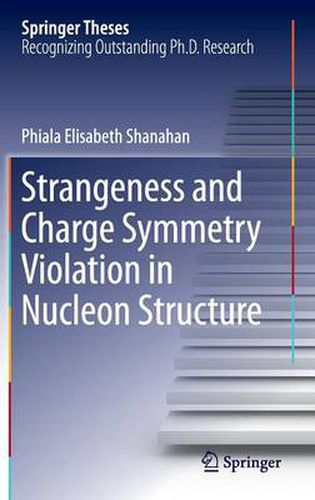Readings Newsletter
Become a Readings Member to make your shopping experience even easier.
Sign in or sign up for free!
You’re not far away from qualifying for FREE standard shipping within Australia
You’ve qualified for FREE standard shipping within Australia
The cart is loading…






This title is printed to order. This book may have been self-published. If so, we cannot guarantee the quality of the content. In the main most books will have gone through the editing process however some may not. We therefore suggest that you be aware of this before ordering this book. If in doubt check either the author or publisher’s details as we are unable to accept any returns unless they are faulty. Please contact us if you have any questions.
This thesis discusses two key topics: strangeness and charge symmetry violation (CSV) in the nucleon. It also provides a pedagogical introduction to chiral effective field theory tailored to the high-precision era of lattice quantum chromodynamics (QCD). Because the nucleon has zero net strangeness, strange observables give tremendous insight into the nature of the vacuum; they can only arise through quantum fluctuations in which strange-antistrange quark pairs are generated. As a result, the precise values of these quantities within QCD are important in physics arenas as diverse as precision tests of QCD, searches for physics beyond the Standard Model, and the interpretation of dark matter direct-detection experiments. Similarly, the precise knowledge of CSV observables has, with increasing experimental precision, become essential to the interpretation of many searches for physics beyond the Standard Model. In this thesis, the numerical lattice gauge theory approach to QCD is combined with the chiral perturbation theory formalism to determine strange and CSV quantities in a diverse range of observables including the octet baryon masses, sigma terms, electromagnetic form factors, and parton distribution functions. This thesis builds a comprehensive and coherent picture of the current status of understanding of strangeness and charge symmetry violation in the nucleon.
$9.00 standard shipping within Australia
FREE standard shipping within Australia for orders over $100.00
Express & International shipping calculated at checkout
This title is printed to order. This book may have been self-published. If so, we cannot guarantee the quality of the content. In the main most books will have gone through the editing process however some may not. We therefore suggest that you be aware of this before ordering this book. If in doubt check either the author or publisher’s details as we are unable to accept any returns unless they are faulty. Please contact us if you have any questions.
This thesis discusses two key topics: strangeness and charge symmetry violation (CSV) in the nucleon. It also provides a pedagogical introduction to chiral effective field theory tailored to the high-precision era of lattice quantum chromodynamics (QCD). Because the nucleon has zero net strangeness, strange observables give tremendous insight into the nature of the vacuum; they can only arise through quantum fluctuations in which strange-antistrange quark pairs are generated. As a result, the precise values of these quantities within QCD are important in physics arenas as diverse as precision tests of QCD, searches for physics beyond the Standard Model, and the interpretation of dark matter direct-detection experiments. Similarly, the precise knowledge of CSV observables has, with increasing experimental precision, become essential to the interpretation of many searches for physics beyond the Standard Model. In this thesis, the numerical lattice gauge theory approach to QCD is combined with the chiral perturbation theory formalism to determine strange and CSV quantities in a diverse range of observables including the octet baryon masses, sigma terms, electromagnetic form factors, and parton distribution functions. This thesis builds a comprehensive and coherent picture of the current status of understanding of strangeness and charge symmetry violation in the nucleon.